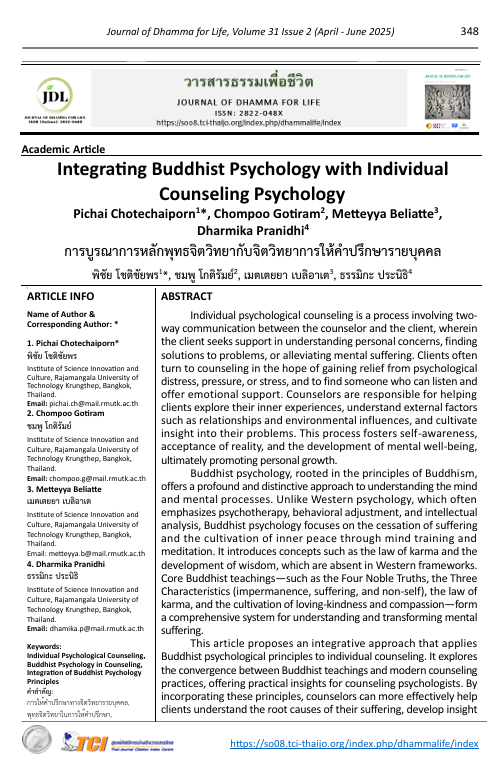Integrating Buddhist Psychology with Individual Counseling Psychology
Main Article Content
Abstract
Individual psychological counseling is a process involving two-way communication between the counselor and the client, wherein the client seeks support in understanding personal concerns, finding solutions to problems, or alleviating mental suffering. Clients often turn to counseling in the hope of gaining relief from psychological distress, pressure, or stress, and to find someone who can listen and offer emotional support. Counselors are responsible for helping clients explore their inner experiences, understand external factors such as relationships and environmental influences, and cultivate insight into their problems. This process fosters self-awareness, acceptance of reality, and the development of mental well-being, ultimately promoting personal growth.
Buddhist psychology, rooted in the principles of Buddhism, offers a profound and distinctive approach to understanding the mind and mental processes. Unlike Western psychology, which often emphasizes psychotherapy, behavioral adjustment, and intellectual analysis, Buddhist psychology focuses on the cessation of suffering and the cultivation of inner peace through mind training and meditation. It introduces concepts such as the law of karma and the development of wisdom, which are absent in Western frameworks. Core Buddhist teachings—such as the Four Noble Truths, the Three Characteristics (impermanence, suffering, and non-self), the law of karma, and the cultivation of loving-kindness and compassion—form a comprehensive system for understanding and transforming mental suffering.
This article proposes an integrative approach that applies Buddhist psychological principles to individual counseling. It explores the convergence between Buddhist teachings and modern counseling practices, offering practical insights for counseling psychologists. By incorporating these principles, counselors can more effectively help clients understand the root causes of their suffering, develop insight and non-attachment, and achieve greater emotional resilience and mental clarity. The integration of Buddhist wisdom into counseling not only enhances the therapeutic process but also empowers clients to attain genuine inner peace.


